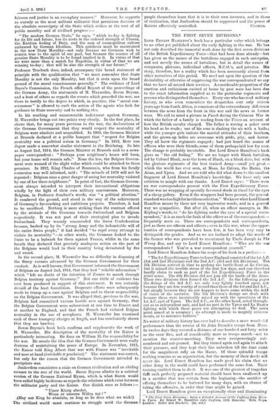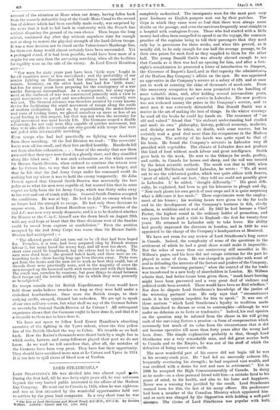THE FIRST SEVEN DrvisioNs.* LORD ERNEST HAMILTON'S book has a
particular value which belongs to no other yet published about the early fighting in the war. He hal not only described the immortal work done by the first seven divisions of the British Expeditionary Force—that had been done already—but has given us the names of the battalions engaged in each enterprise, and not merely the names of battalions, but in detail tho names of companies, platoons, individual officers, N.C.O.'s, and privates. Ms story, therefore, has a reality which has been necessarily absent frora other narratives of this period. We need not open the question of the desirability or otherwise of suppressing the war correspondents if we say that we have all missed their services. A considerable proportion of the emotion and enthusiasm excited at home by past wars has been due to the exact information supplied as to the particular regiments and persons who distinguished themselves. Every one who has read military history, or who even remembers the despatches sent only sixteen years ago from South Africa, is conscious of the extraordinary difference between the news from the front in this war and the news in former wars. We call to mind a picture in Punch during the Crimean War in which the father of a family is reading from the Times an account of how the British cavalry charged. The father is waving a poker over his head as he reads ; one of his sons is slashing the air with a knife; while the younger girls imitate the martial attitudes of their brothers, and the grown-up ladies are overcome with pride, pity, and horror. They all knew the regiments engaged ; had just heard the names of officers who were their friends, some of them perhaps laid low for over. The change is probably inevitable. But Lord Ernest Hamilton's beak gives us "the old feeling." We are no longer with Blank battalion, led by Colonel Blank, near the town of Blank, on a blank date, but with the glorious regiments of the best trained Army—small yet great— which the world has ever seen, at Mons, Le Cateau, the Marne, the Aisne, and Ypres. And we are told who did what down to the smallest fragment of Lord Ernest Hamilton's knowledge. We have only one criticism to mingle with our thanks. Lord Ernest says : There were no war correspondents present with the First Expeditionary Force. There was no wrapping of specially favoured deeds in tinsel for the eyes of a cheap gallery. Even if the wrappers had been present, the general standard was too high for invidious selection." We know what Lord Ernest Hamilton means by these not very impressive words, and in a general way we sympathize. But after all, when an officer manages, in Mr. Kipling's words, to "do his fighting under the eyes of a special corre- spondent," it is as much the fault of the officer as of the correspondent— frequently more so. There are correspondents and correspondents. just as there are officers and officers ; even in this war, where the oppor- tunities of correspondents have been few, it has been very easy te distinguish the grades. And so we are inclined to adapt the words of the farmer who was provoked to resentment by Uncle Joseph in Ths Wrong Box, and say to Lord Ernest Hamilton : "Who are the war correspondents 1 You're a war correspondent yourself."
Lord Ernest Hamilton defines the scope of his book in a preface :— " The 1st Expeditionary Force to leave England consisted of the 1st A.C. (1st and 2nd Divisions) and the 2nd A.C. (3rd and 5th Divisions). The 4th Division arrived in time to prolong the battle-front at Le Catcall. but it missed the terrible stress of the first few days, and can therefore hardly claim to rank as part of the 1st Expeditionary Force in the strict sense. The 6th Division did not join till the battle of the Aisne. These two divisions then formed the 3rd A.C. In the following pages the doings of the 3rd A.C. are only very lightly touched upon, not because they are less worthy of record than those of the 1st and 2nd A.C., but simply because they do not happen to have come within the field of vision of the narrator. The 7th Division's doings are dealt with because these were inextricably mixed up with the operations of the 1st A.C. east of Ypres. The 3rd A.C., on the other hand, acted through- out as an independent unit, and had no part in the Ypres and La Bassets fighting with which these pages are attempting to deal. The main point aimed at is accuracy ; no attempt is made to magnify achieves ments, or to minimize failures."
No writer of military history has ever had to describe a more wonderful performance than the retreat of Sir John French's troops from Mons. In twelve days they covered a distance of one hundred and forty miles as the crow flies, and of considerably more as troope march—not La mention the counter-marching. They were overpoweringly oat. numbered and out-gunned. But they turned again and again to attack their pursuers, and they kept their line unbroken till the time carelli for the magnificent rally on the Marne. Of those splendid troops nothing remains as an organization, but the memory of their deeds will never die. Lord Ernest Hamilton has made good his claim that no other Army in the world could have performed the same feat. Their training enabled them to do it. It was one of the greatest of tragedies that such perfectly prepared material should have been swallowed up in a sacrifice that was certain from the beginning—the sacrifice of offering themselves to be battered for many days, with no chance 'ef taking the offensive, in order that time might be gained.
Lord Ernest Hamilton gives an exceptionally clear and illuminating
• The First Seven Divieions : being a Ddailed Account of the Fighting from ifaaa to rpm. By Ernest W. Hamilton (late Captain, Ilth Hussars). With Maps London: Hurst and Blackett. (6s. net.!
account of the situation at Mons when our Army, having fallen back from the scarcely defensible loop of the Cond&31ons Canal to the second line of defence which had been carefully made ready, was surprised by the news that it had to fall back in conformity with the French line without disputing the ground of its own choice. Then began the long retreat, continued day after day without anywhere time for enough rest or sleep to restore the physical strength of the hard-driven troops. It was a wise decision not to stand on the Valenciennes-Maubeuge lino, for there our Army would almost certainly have been surrounded. Yet a prolonged stand, if it had been possible, would have been more of a respite for our men than the unceasing marching, when all the facilities for rapidity were on the side of the enemy. As Lord Ernest Hamilton rays :— " Our wars for sixty years past have been • little wars' fought in far-off countries more or less uncivilized ; and the probability of our armies fighting on European soil has always been considered as remote. Germany, on the other hand, has had few little wars,' but has for many years been preparing for the contingency of a war amidst European surroundings. As a consequence, her army equip- ment at the outbreak of war was constructed primarily with a view to rapid movements on paved and macadamized roads ; certainly ours was not. The German advance was therefore assisted by every known device for facilitating the rapid movement of troops along the roads of modern civilization. Later on, by requisitioning the motor-lorries and vans of trading firms, we placed ourselves on more or less of an equal footing in this respect, but that was not when the necessity for rapid movement was most keenly felt. The Germans reaped a double advantage, for not only were they capable of quicker movement, but they were also able to overtake our rear-guards with troops that were not jaded with interminable marching."
Even troops who had had practically no fighting were dead-beat from sheer marching. Of the 2nd Division we read "The reservists' beets were all too small, and their feet swelled horribly. Hundreds fell out from absolute exhaustion. . . . Some of the cavalry that saw them pass said that their eyes were fixed in a ghastly stare, and they stumbled along like blind men." It was such exhaustion as this which caused Sir Horace Smith-Dorrien, when ordered to continue the retreat over the Lc Cateau line, to say that his men could march no longer, and that he felt that the 2nd Army Corps under his command could do nothing but try where it was to hold the enemy temporarily. Sir John French agreed that General Smith-Dorrien was necessarily the best judge as to what his men were capable of, but warned him that he must expect no help from the 1st Army Corps, which was thirty miles away to the cast and out of touch with him. General Smith-Dorrien accepted the conditions. He was at bay. He had to fight an enemy whom he no longer had the strength to escape. Ile had only three divisions to appose seven. As Lord Ernest Hamilton says : "The position of the 2nd A.C. was now very nearly desperate, and it is to be doubted whether Sir Horace or the C.-in-C. himself saw the dawn break on August 26th with any real hope at heart that the three divisions west of the Sambre could he saved from capture or annihilation." Even the position occupied by the 2nd Army Corps was worse than Sir Horace Smith- Dorrien had anticipated : – "The allotted posts did not turn out to be all that had been hoped for. Trenches, it is true, had been prepared (dug by French woman labour !). but many faced the wrong way, and all were too short. The short ones could be lengthened, but the others had to be redug. The Men were dead beat : the ground baked hard, and there were no en- trenching tools—these having long ago been thrown away. Picks were got from the farms and the men set to work as best they could, but of shovels there were practically none, and in the majority of eases the men scooped up the loosened earth with mess-tins and with their hands. The result was, trenches by courtesy, but poor things to stand between fired troops and the terrific artillery fire to which they were presently to be subjected."
No troops outside the 1st British Expeditionary Force would have held those make-believe trenches so long as they were held under a diabolical bombardment. Once more the British troops, to their undying credit, escaped, thinned but unbroken. We are apt to speak of our own military errors, but what shall we say of the German failure to overwhelm General Smith-Dorrien at Le Cateau? All subsequent experience shows that the Germans ought to have done it, and that it is a discredit to them not to have done it.
We have not space to follow Lord Ernest Hamilton's absorbing narrative of the fighting in the Ypres salient, where the thin yellow line of the British blocked the way to Calais. We tremble as we look back. How the Kaiser's thousands were thrust back by a single line in which cooks, farriers, and camp-followers played their part we do not know. As wo read we tell ourselves that, after all, the mistakes of the Cermans have been very great. They have lost their opportunity. They should have sacrificed more men at Le Cateau and Ypres in 1914. It is too late to spill rivers of blood now at Verdun.



































 Previous page
Previous page